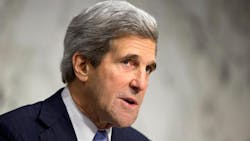US to Sign Global Treaty on Conventional Arms Trade
UNITED NATIONS – U.S. Secretary of State John Kerry will this week sign the first global treaty to regulate the $80 billion annual trade in conventional arms, seeking to stem the flow of weapons used in war crimes and genocide.
A source familiar with the diplomatic maneuvers confirmed that Kerry would sign the treaty Wednesday after it was adopted earlier this year by the United Nations to regulate trade in tanks, armored combat vehicles, combat aircraft, attack helicopters, missiles as well as small arms.
The treaty, which has been years in the making, was only adopted after tough negotiations at the United Nations. The talks had deadlocked last year after the United States asked for more time to look over the draft text.
Kerry praised the adoption of the treaty in saying it was "strong, effective and implementable" and insisted it would not infringe on the U.S. Constitution and the Second Amendment right to bear arms.
The pact "can strengthen global security while protecting the sovereign right of states to conduct legitimate arms trade," he added in his statement in April.
It is the first major arms accord since the 1996 Comprehensive Nuclear Test Ban Treaty and covers all conventional weapons.
It has no automatic enforcement. However, it seeks to force the weapons industry within accepted boundaries.
Though the United States -- which is the world's biggest arms producer -- has endorsed the treaty, the U.S. Congress must still ratify it.
Pact Only Regulates International Trade
The powerful arms lobby in the United States has already voiced objections, fearful that it could infringe on individual gun rights within U.S. borders.
But Kerry stressed in April that the pact only referred to "international trade, and reaffirms the sovereign right of any state to regulate arms within its territory."
The pact would create "a common international standard for the national regulation of the international trade in conventional arms and require all states to develop and implement the kind of systems that the United States already has in place," Kerry said.
It would also "help reduce the risk that international transfers of conventional arms will be used to carry out the world's worst crimes, including terrorism, genocide, crimes against humanity, and war crimes."
The United States is meanwhile embroiled in a heated domestic gun control debate, following a series of high-profile shootings.
Copyright Agence France-Presse, 2013
About the Author
Agence France-Presse
Copyright Agence France-Presse, 2002-2025. AFP text, photos, graphics and logos shall not be reproduced, published, broadcast, rewritten for broadcast or publication or redistributed directly or indirectly in any medium. AFP shall not be held liable for any delays, inaccuracies, errors or omissions in any AFP content, or for any actions taken in consequence.
